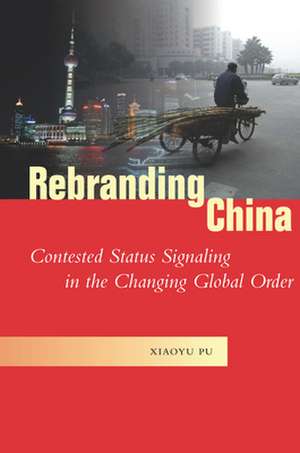Rebranding China – Contested Status Signaling in the Changing Global Order: Studies in Asian Security
Autor Xiaoyu Puen Limba Engleză Hardback – 14 ian 2019
As competing pressures mount across domestic and international concerns, China must pivot between different representational tactics. Rebranding China demystifies how the state represents its global position by analyzing recent military transformations, regional interactions, and international financial negotiations. Drawing on a sweeping body of research, including original Chinese sources and interdisciplinary ideas from sociology, psychology, and international relations, Rebranding China puts forward an innovative framework for interpreting China's contradictory status signaling.
Din seria Studies in Asian Security
-
 Preț: 223.78 lei
Preț: 223.78 lei - 23%
 Preț: 777.47 lei
Preț: 777.47 lei -
 Preț: 195.32 lei
Preț: 195.32 lei -
 Preț: 207.62 lei
Preț: 207.62 lei -
 Preț: 210.91 lei
Preț: 210.91 lei -
 Preț: 228.62 lei
Preț: 228.62 lei -
 Preț: 157.94 lei
Preț: 157.94 lei -
 Preț: 193.58 lei
Preț: 193.58 lei -
 Preț: 265.56 lei
Preț: 265.56 lei -
 Preț: 177.64 lei
Preț: 177.64 lei -
 Preț: 173.10 lei
Preț: 173.10 lei -
 Preț: 244.10 lei
Preț: 244.10 lei - 19%
 Preț: 447.32 lei
Preț: 447.32 lei - 19%
 Preț: 536.91 lei
Preț: 536.91 lei -
 Preț: 263.05 lei
Preț: 263.05 lei -
 Preț: 187.76 lei
Preț: 187.76 lei -
 Preț: 445.11 lei
Preț: 445.11 lei -
 Preț: 444.14 lei
Preț: 444.14 lei - 23%
 Preț: 725.31 lei
Preț: 725.31 lei - 19%
 Preț: 448.80 lei
Preț: 448.80 lei - 19%
 Preț: 477.19 lei
Preț: 477.19 lei -
 Preț: 211.46 lei
Preț: 211.46 lei - 19%
 Preț: 448.80 lei
Preț: 448.80 lei - 19%
 Preț: 476.44 lei
Preț: 476.44 lei -
 Preț: 517.10 lei
Preț: 517.10 lei - 19%
 Preț: 447.87 lei
Preț: 447.87 lei - 19%
 Preț: 644.44 lei
Preț: 644.44 lei
Preț: 512.32 lei
Nou
98.03€ • 102.61$ • 81.59£
Carte tipărită la comandă
Livrare economică 31 martie-14 aprilie
Specificații
ISBN-10: 150360683X
Pagini: 176
Dimensiuni: 157 x 236 x 18 mm
Greutate: 0.39 kg
Editura: MK – Stanford University Press
Seria Studies in Asian Security
Cuprins
This chapter provides an overview of the research question, key concepts, and research design of the book. China has been sending contradictory signals about its status and role in the twenty-first century, sometimes emphasizing its great power status and other times presenting itself as a fragile developing country. Instead of focusing on China's struggle for more recognition as a great power, the book suggests that China is facing a more complicated challenge of international image projection. China's future challenge will be to manage its conflicting roles and images in ways that advance its national interests while not engendering dangerous misperceptions and expectations among its neighbors and the rest of the global community. This book takes a multimethod approach, including case studies, content analysis, and interviews.
This chapter discusses the theoretical framework of status signaling in international politics. Status signaling is the use of a particular subset of signals to convey the information that a state is asserting a particular standing in international society. In a general sense, status signaling is the mechanism of information transmission that aims to change or maintain a special type of status belief among relevant political actors. Each audience is different, so an emerging power sends different status signals. There are various means through which the national leaders can signal the preferred status of their nation. This chapter identifies strategies and tactics of status signaling: conspicuous consumption, conspicuous giving, and strategic spinning.
This chapter describes China's multiple identities and audiences in detail. China's identities include that of socialist country, developing country, both emerging and established great power, and quasi superpower, and its audiences include the domestic, regional, global South, and Western domains. While China certainly intends to build a positive image, the country has multiple incentives to project different images. This chapter illuminates the various motivations of China's signaling behaviors.
This chapter opens with a conceptual analysis of how China signals a higher status through conspicuous consumption in international relations. It then turns to the importance of domestic audience and nationalism. The chapter discusses China's aircraft carrier project and 2015 military parade, examining the underlying motivations and comparing the status signaling argument with competing approaches.
This chapter analyzes China's competing images in regional diplomacy. China signaled a higher status as a regional leader through conspicuous giving in the Asian financial crisis, and China has strengthened its charm offensive strategy in recent years. However, China has also tried to defend its maritime claims through selective coercion. The two faces of China's regional diplomacy pose a challenge to regional order.
This chapter analyzes China's strategic spinning during the global financial crisis. Facing two types of global audiences (the global South and the West), China sometimes highlights its profile as an emerging great power and other times downplays its profile by emphasizing its developing country status. A developing country status serves multiple purposes for China. Targeting the West, signaling a developing country status sends a reassuring message, and it allows China to shirk greater international responsibilities. Targeting the global South, signaling a developing country status plays the solidarity card. The tension between China's great power status and its identity of developing country is bound to increase as China seeks a new role in the twenty-first century.
The concluding chapter summarizes the findings and implications for China's foreign policy, status politics, and signaling in international relations more broadly. Applying the analytical framework of status signaling, the chapter also provides a preliminary analysis of Xi Jinping's foreign policy in a new era.
